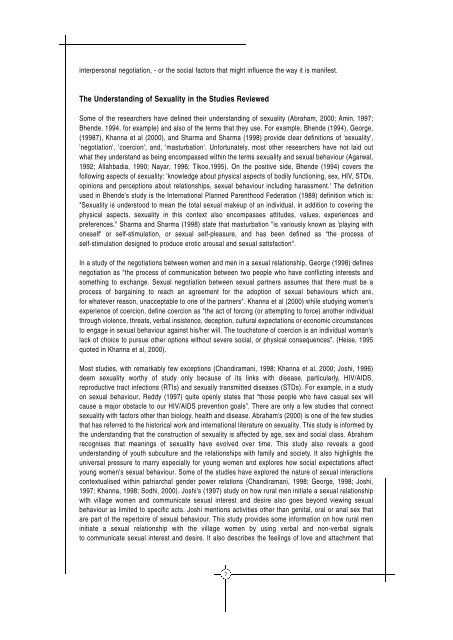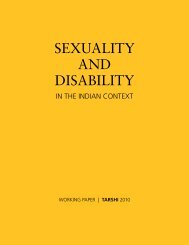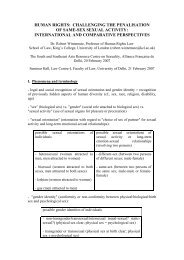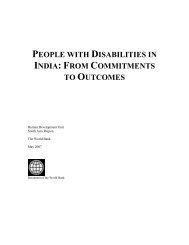FREE Download - TARSHI
FREE Download - TARSHI
FREE Download - TARSHI
Create successful ePaper yourself
Turn your PDF publications into a flip-book with our unique Google optimized e-Paper software.
interpersonal negotiation, - or the social factors that might influence the way it is manifest.<br />
The Understanding of Sexuality in the Studies Reviewed<br />
Some of the researchers have defined their understanding of sexuality (Abraham, 2000; Amin, 1997;<br />
Bhende, 1994, for example) and also of the terms that they use. For example, Bhende (1994), George,<br />
(19987), Khanna et al (2000), and Sharma and Sharma (1998) provide clear definitions of 'sexuality',<br />
'negotiation', 'coercion', and, 'masturbation'. Unfortunately, most other researchers have not laid out<br />
what they understand as being encompassed within the terms sexuality and sexual behaviour (Agarwal,<br />
1992; Allahbadia, 1990; Nayar, 1996; Tikoo,1995). On the positive side, Bhende (1994) covers the<br />
following aspects of sexuality: 'knowledge about physical aspects of bodily functioning, sex, HIV, STDs,<br />
opinions and perceptions about relationships, sexual behaviour including harassment.' The definition<br />
used in Bhende's study is the International Planned Parenthood Federation (1989) definition which is:<br />
"Sexuality is understood to mean the total sexual makeup of an individual, in addition to covering the<br />
physical aspects, sexuality in this context also encompasses attitudes, values, experiences and<br />
preferences." Sharma and Sharma (1998) state that masturbation "is variously known as 'playing with<br />
oneself' or self-stimulation, or sexual self-pleasure, and has been defined as “the process of<br />
self-stimulation designed to produce erotic arousal and sexual satisfaction".<br />
In a study of the negotiations between women and men in a sexual relationship, George (1998) defines<br />
negotiation as "the process of communication between two people who have conflicting interests and<br />
something to exchange. Sexual negotiation between sexual partners assumes that there must be a<br />
process of bargaining to reach an agreement for the adoption of sexual behaviours which are,<br />
for whatever reason, unacceptable to one of the partners". Khanna et al (2000) while studying women's<br />
experience of coercion, define coercion as "the act of forcing (or attempting to force) another individual<br />
through violence, threats, verbal insistence, deception, cultural expectations or economic circumstances<br />
to engage in sexual behaviour against his/her will. The touchstone of coercion is an individual woman's<br />
lack of choice to pursue other options without severe social, or physical consequences”. (Heise, 1995<br />
quoted in Khanna et al, 2000).<br />
Most studies, with remarkably few exceptions (Chandiramani, 1998; Khanna et al, 2000; Joshi, 1996)<br />
deem sexuality worthy of study only because of its links with disease, particularly, HIV/AIDS,<br />
reproductive tract infections (RTIs) and sexually transmitted diseases (STDs). For example, in a study<br />
on sexual behaviour, Reddy (1997) quite openly states that “those people who have casual sex will<br />
cause a major obstacle to our HIV/AIDS prevention goals”. There are only a few studies that connect<br />
sexuality with factors other than biology, health and disease. Abraham's (2000) is one of the few studies<br />
that has referred to the historical work and international literature on sexuality. This study is informed by<br />
the understanding that the construction of sexuality is affected by age, sex and social class. Abraham<br />
recognises that meanings of sexuality have evolved over time. This study also reveals a good<br />
understanding of youth subculture and the relationships with family and society. It also highlights the<br />
universal pressure to marry especially for young women and explores how social expectations affect<br />
young women's sexual behaviour. Some of the studies have explored the nature of sexual interactions<br />
contextualised within patriarchal gender power relations (Chandiramani, 1998; George, 1998; Joshi,<br />
1997; Khanna, 1998; Sodhi, 2000). Joshi's (1997) study on how rural men initiate a sexual relationship<br />
with village women and communicate sexual interest and desire also goes beyond viewing sexual<br />
behaviour as limited to specific acts. Joshi mentions activities other than genital, oral or anal sex that<br />
are part of the repertoire of sexual behaviour. This study provides some information on how rural men<br />
initiate a sexual relationship with the village women by using verbal and non-verbal signals<br />
to communicate sexual interest and desire. It also describes the feelings of love and attachment that<br />
7










